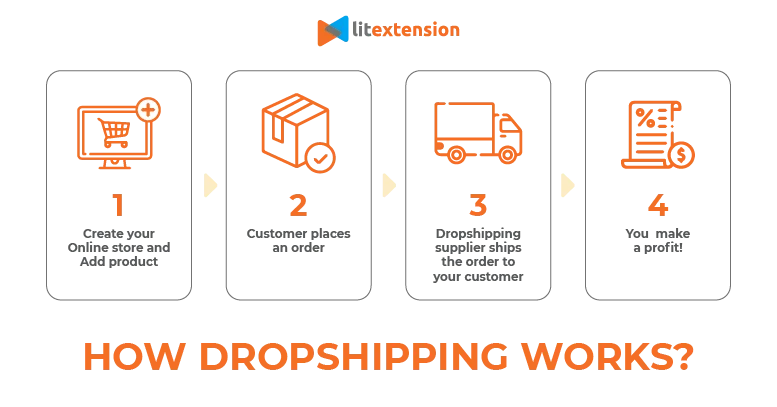Introduction
The eCommerce industry is changing rapidly. No merchants ever want to stay out of this tough yet lucrative market. The big question is: How to adapt with the current situation when the competition out there is fierce? Spotting the latest trends in eCommerce can effectively solve the problems. In this article, LitExtension will present you 11 latest eCommerce trends 2022 that help your business flourish.
One Report to Win Your eCommerce Game
Are you ready to unveil the future of eCommerce 2022 and rocket your sales?
Get our ultimate eCommerce report and THRIVE now!
11 Essential eCommerce Trends 2022

#1. Mobile Commerce
What is Mobile Commerce?
Mobile commerce (m-commerce) is the act of buying and selling goods via wireless-handheld devices such as smartphones and tablets.
Despite the pandemic, m-commerce revenue is forecasted to reach its highest level in history. In the United States, smartphone retail eCommerce sales are expected to exceed $432 billion by 2022. Additionally, by 2025, the value is expected to have nearly doubled, to roughly 710 billion dollars.
How can merchants benefit from Mobile eCommerce trends?
Merchants may improve their customers’ experiences and hence increase earnings by following eCommerce mobile trends, because:
- Customers may access a greater choice of products, conduct product research before purchasing, and buying comfortably from their own homes
- Customers may take advantage of their shopping experience with mobile commerce with online shopping or curbside pickup
Magento (Adobe Commerce) excels in Mobile Commerce. With Magento, merchants can create immersive mobile commerce experiences using progressive web applications. Furthermore, they can build their own high performance PWAs to increase customer engagement, conversion rates, and revenue.
#2. Social Commerce & Live Streaming
What is Social Commerce?
Social commerce is the act of selling directly on social networking sites. eMerchants can use social media platforms like Facebook, Instagram, and TikTok to promote and sell their items. For an instance, if you want to promote and sell your item on Instagram, you can use Instagram tools to get the most out of that platform.
When it comes to social commerce, it would be a tremendous mistake for firms shifting to social media marketing to ignore live streaming commerce. In August 2021, TikTok and Shopify, in collaboration, launched TikTok Shopping. This social commerce experience will bring in-app shopping and streamlined product discovery to the platform.
How can merchants benefit from Social Commerce trends?
According to PR Newswire, the global live streaming business is expected to be worth $247 billion in 2027. If you’re already selling somewhere else, social media networks can effectively help you increase profits and revenues. If customers share or repost products, you get chances to spread your brand images to a larger audience!
eCommerce platforms builders won’t stay out of the game to catch up with current trends in eCommerce. Through TikTok’s partnerships, Shopify, PrestaShop, BigCommerce are now available on the platform.
#3. Digital Payment in eCommerce
What is Digital Payment?
The process of transferring money between sellers and purchasers through online payment methods or digital devices (mobile phone, point-of-sale system, etc.) is digital payment.
The evolution of eCommerce payments trends have been spurred by the shift in purchasing behavior brought on by mobile commerce & social commerce. According to McKinsey, in 2021, 82% of Americans use digital payments, which are defined as browser-based or in-app online purchases, in-store checkout using a mobile phone and/or QR code, and person-to-person (P2P) payments.
How can merchants benefit from Digital Payment in eCommerce?
The rise of online payments trends indicate that eCommerce firms should adopt new technology in the checkout process. eMerchants will have a better chance of increasing their revenue when they have a wide range of payment choices by offering e-wallet or Buy Now Pay Later as payment choices.
What is more, faster and more convenient digital payments will improve customers’ online buying experiences. As a result, merchants can reduce cart abandonment and increase sales volume.
Besides, if you enable Buy Now Pay Later, customers can shop without worrying about their current financial situation. This feature will prompt customers to purchase more and thus increase average order value.
eCommerce platform providers catch up with the eCommerce trends 2022 very well. Shopify launched Shop Pay and Shopify Payment. Besides, Wix also launched Wix Payment.
#4. Omnichannel Commerce
What is Omnichannel Commerce?
The act of allowing customers to shop across many selling channels is Omnichannel commerce. Customers might look for products online and then purchase them through another channel (brick-and-mortar or other online channels).
As a merchant, you may sell and manage several channels from one location. It not only saves you time and money, but it also increases the income and profitability of your store.
How can merchants benefit from Omnichannel Trends?
Adapting with Omnichannel eCommerce trends 2022, merchants are able to boost brand awareness by displaying their items across several selling channels, such as online and in physical stores. With an Omnichannel strategy, you can make a customer’s buying experience as pleasant as possible.
Each sales channel has a certain consumer base that you may use to market products to specific audiences. If segmentation and customization are done right, Omnichannel marketing can increase conversion rates. Digital retail brands can greatly enhance consumer engagement by using dynamic content based on user behavior, clickstream data, context, product recommendations, and exclusive personalized offers.
In this eCommerce trends 2022 article, we recommend LitCommerce – the Multi-Channel Selling Tool. This tool can integrate your multiple stores and let you sell, manage your store at a single place.
#5. Sustainable Commerce
What is Sustainable Commerce?
Sustainable commerce refers to businesses that use green products and eco-friendly packaging to reduce carbon emissions and employ green technology.
Although eCommerce sustainability trends is not one of the newest eCommerce trends, its impact lasts for centuries. Aside from the environmental impact, establishing eCommerce sustainability benefits the success of online retailers in a variety of ways.
How can merchants benefit from Omnichannel Commerce?
According to Retail Dive, in the next two years, there will be nearly 60% of customers willing to purchase from sustainable eCommerce brands. Thus, eCommerce sustainability businesses may take advantage of this wonderful opportunity to attract more visitors as the number of environmentally conscious shoppers continues to rise. These visitors might become loyal customers and sales could skyrocket if you use the right methods to maximize conversions.
eMerchants can also utilize eCommerce sustainability as a barometer to improve their brand’s reputation. Being a long-term eCommerce business will make your store stand out from the crowd and make you have a better opportunity of standing out from the competition.
Shopify launched the sustainability fund by using Bullfrog. Historically, Shopify uses Bullfrog’s credits to offset the use of energy within their Canadian campus.
Want to migrate from BigCommerce to Shopify
If you are intending to migrate from BigCommerce to Shopify, LitExtension offers a great migration service that helps you transfer your data from the current eCommerce platform to a new one accurately, painlessly with utmost security.
#6. Artificial Intelligence (AI) & Augmented Reality (AR) in eCommerce
What is Artificial Intelligence (AI)?
Artificial intelligence (AI) is a clever system that can do complex tasks with great accuracy by mimicking human intelligence. AI can learn from its mistakes and the data it collects to improve itself.
What is Augmented Reality (AR)?
Augmented Reality (AR) is the mixing of digital visual elements, sound, or other sensory cues given via technology to create a sense of the real physical environment.
Customers may experience a product or service in their own environment and at their own pace using AR applications from eCommerce retailers. When buying a watch online, for example, AR may show customers how the watch would look in their hands, giving them more confidence in their purchase.
How can merchants benefit from AI & AR trends?
The two most outstanding AI trends for eMerchants to level up their stores are AI price recommendations and AI product recommendations.
Augmented reality enables customers to try out a product online and evaluate how well it works for them. Instead of plain words, customers can enter real-world images such as photos, screenshots, and internet images, and the algorithm will locate the most appropriate results. Thus, the shopping experience will be a lot more exciting. As a result, there are more conversion opportunities!
Adobe Experience League (Magento Enterprise) gives merchants chances to apply AI & AU models into their store front. By utilizing AU & AI, merchants can deliver great user experience to customers.

#7. Personalization in eCommerce
What is Personalization in eCommerce?
Personalization in eCommerce is the set of customizing personal experiences, catalog & price lists, etc… With personalization, customers can enjoy a seamless experience when they get access to what they are interested in.
How can merchants benefit from eCommerce personalization trends?
With personalization in eCommerce, eMerchants can deliver a personal & unique experience to customers based on their intents, preferences, browsing history, or previous purchases. By which, a seamless and personalized experience can be created. Therefore, merchants can minimize high cart abandonment.
Adobe Commerce Cloud by Adobe Experience Cloud is great for personalization. This cloud-based data solution lets you work quickly and efficiently with the same sort of frictionless UX they’re striving to create for your customers.
#8. Dropshipping eCommerce
What is Dropshipping eCommerce?
Dropshipping is a type of retail operation in which the things sold are not kept in stock by the vendor. When the vendor receives the orders, he or she will send the shipment information to the dropshipping providers. The orders will then be fulfilled and shipped straight to the clients by the vendors. As a result, the vendor is relieved of the need to hold inventory or send things directly.

How can merchants benefit from Dropshipping trends?
There are 4 noticeable benefits that eMerchants can enjoy:
- Lower startup costs
- Lower inventory management
- Broad product offerings
- Flexibility in selling various products
What is more, the global dropshipping market is estimated to reach $107.86 billion USD by 2026, growing at a CAGR of 6.93 percent. This means that merchants can earn substantial profit when being in this lucrative market. You may check out this eCommerce product trends 2022 to gain better store performance.
WooCommerce is a good choice for dropshipping. By integrating proper dropshipping plugins, merchants can take it easy whenever they have any orders and the rest tasks will be taken care of automatically.
#9. B2B eCommerce
What is B2B eCommerce?
Business-to-Business eCommerce, or B2B eCommerce, is the sale of goods or services via an online sales platform in which both parties are businesses. In other words, a B2B transaction occurs when one firm sells its products or services to another company.
How can merchants benefit from B2B eCommerce trends?
Firstly, they can increase the conversion rates. The majority of purchasers set their initial purchasing decisions based on price and quality. Whether they finish the deal or not, everything largely depends on how convenient it is for them, or how they can make profits.
Applying a B2B eCommerce platform reduces the costs of running a standalone website or digital storefront. What is more, merchants can use a catalog maker to generate and manage a digital catalog, by streamlining operations.
Using a B2B eCommerce platform also reduces lost income or customer turnover as a result of order or delivery problems. Furthermore, merchants also narrow labor costs for order taking, fulfillment, and customer support, and inventory management.
LitExtension suggests 9 best B2B eCommerce platforms for B2B eCommerce trends 2022. These platforms will greatly help your business with high security, customization, wholesale & omnichannel access.
#10. DTC eCommerce
What is DTC eCommerce?
Direct-to-Customer (or D2C) is an eCommerce strategy that allows businesses to sell items directly to consumers. This strategy eliminates the need for a middleman (such as a merchant or reseller) to get your product to market.
How can merchants benefit from DTC trends?
Since the epidemic, D2C brands have been able to keep the ship afloat far more successfully than traditional shops. With their robust digital infrastructure, DTC businesses were able to capture sales as other merchants lost momentum.
According to eMarketer’s forecast, US DTC eCommerce sales will reach $151.20 billion in 2022, an increase of 16.9% compared to 2021. Thus, businesses can absolutely take advantage of this trend to scale up business.
For this eCommerce trends 2022 article, LitExtension suggests you choose BigCommerce or Shopify Plus for you to catch up with DTC eCommerce trends!

#11. Affiliate Marketing eCommerce
What is Affiliate Marketing eCommerce?
Affiliate marketing is a type of advertising in which a company pays third-party publications (or “affiliates”) to advertise its items.
Each affiliate is given a separate affiliate link. The activity will be tracked to that affiliate and they will get a commission if someone clicks it and visits your site (perhaps making a purchase or registering as a lead).
Affiliate programs are available for both goods and services. For example, car rental affiliate program offers their affiliates to earn a commission when someone rents a car. The sale is registered in the affiliate’s account, where commissions are easily tracked. Payments are usually done after the service is actually performed.
How can merchants benefit from Affiliate Marketing trends for 2022?
Affiliate marketing eCommerce involves partnering with a more well-known eCommerce entrepreneur in your niche and asking them to sell your products to his or her audience. From that, there is a high chance that more potential customers to your website, those are willing to make a purchase!
In exchange, you’d give the affiliate a cut of the profits from each transaction he or she makes. You can compensate your affiliates using a variety of models, including:
- Pay-per-click advertising
- Pay for each action you take
- Revenue Part of the revenue
eCommerce platforms like BigCommerce or marketplaces like Amazon are great for Affiliate Marketing. To adapt with eCommerce trends 2022, merchants can integrate online stores (BigCommerce & Amazon) to optimize customer experience!
eCommerce Trends 2022 – FAQs
[sp_easyaccordion id=”47264″]
eCommerce Trends 2022 – Final Thoughts
Forecasting the upcoming and new trends in eCommerce will definitely help businesses at any scale! Furthermore, eCommerce will always open the door for any merchants to make their business bloom. We hope that with 11 latest eCommerce trends 2022, you can understand and thus, make the right strategies for your business!
If you’re about to migrate to other eCommerce platform, LitExtension – #1 Shopping Cart Migration Expert is here to help! With 200,000+ successful migrations for 100,000+ worldwide customers, LitExtension can transfer all your data automatically and accurately.
For further information, please join our Facebook Community for exchanging and updating eCommerce news!

